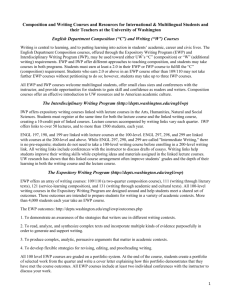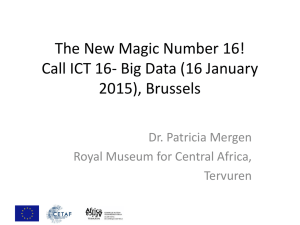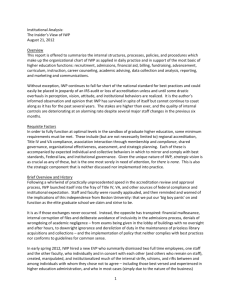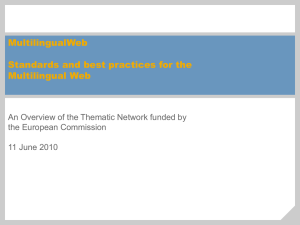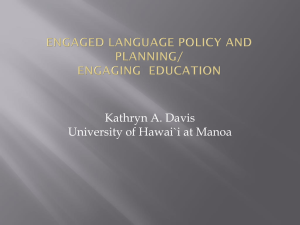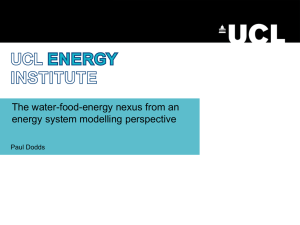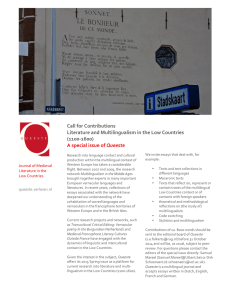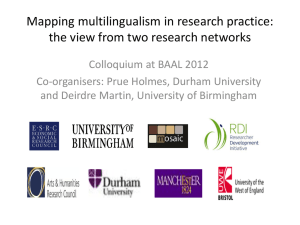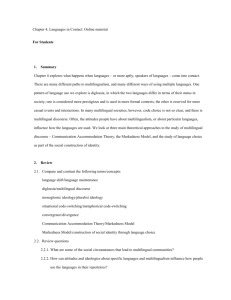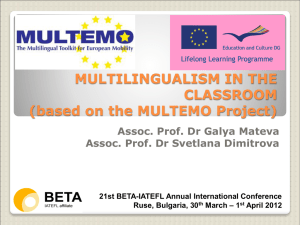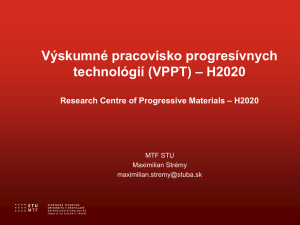Handout (DOC)
advertisement
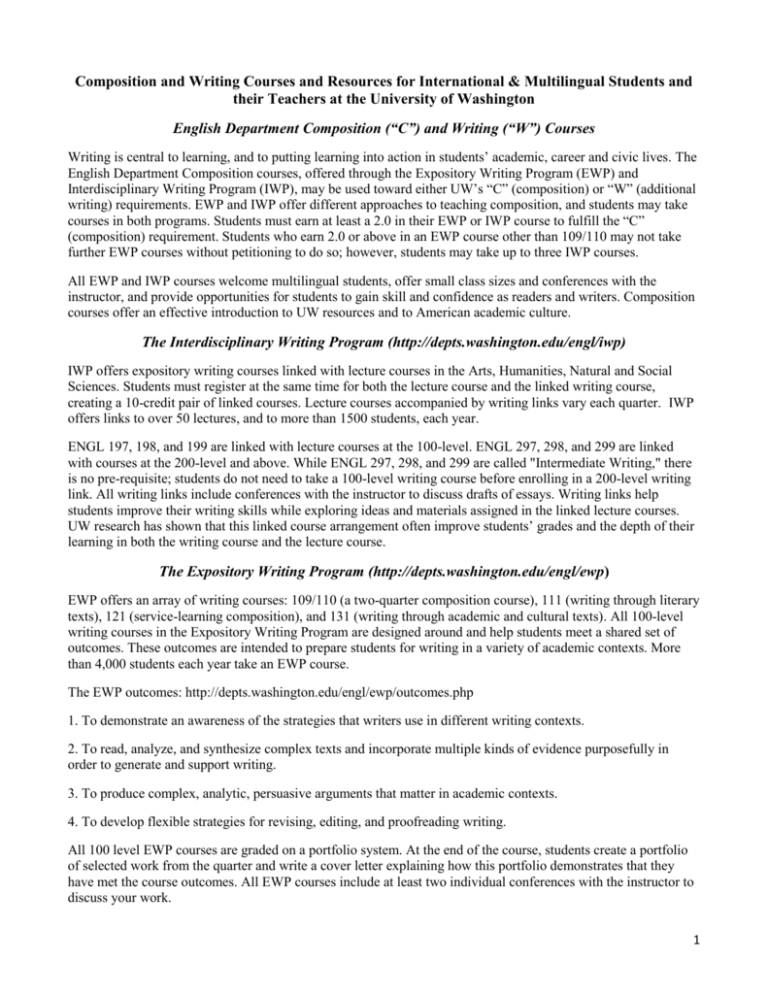
Composition and Writing Courses and Resources for International & Multilingual Students and their Teachers at the University of Washington English Department Composition (“C”) and Writing (“W”) Courses Writing is central to learning, and to putting learning into action in students’ academic, career and civic lives. The English Department Composition courses, offered through the Expository Writing Program (EWP) and Interdisciplinary Writing Program (IWP), may be used toward either UW’s “C” (composition) or “W” (additional writing) requirements. EWP and IWP offer different approaches to teaching composition, and students may take courses in both programs. Students must earn at least a 2.0 in their EWP or IWP course to fulfill the “C” (composition) requirement. Students who earn 2.0 or above in an EWP course other than 109/110 may not take further EWP courses without petitioning to do so; however, students may take up to three IWP courses. All EWP and IWP courses welcome multilingual students, offer small class sizes and conferences with the instructor, and provide opportunities for students to gain skill and confidence as readers and writers. Composition courses offer an effective introduction to UW resources and to American academic culture. The Interdisciplinary Writing Program (http://depts.washington.edu/engl/iwp) IWP offers expository writing courses linked with lecture courses in the Arts, Humanities, Natural and Social Sciences. Students must register at the same time for both the lecture course and the linked writing course, creating a 10-credit pair of linked courses. Lecture courses accompanied by writing links vary each quarter. IWP offers links to over 50 lectures, and to more than 1500 students, each year. ENGL 197, 198, and 199 are linked with lecture courses at the 100-level. ENGL 297, 298, and 299 are linked with courses at the 200-level and above. While ENGL 297, 298, and 299 are called "Intermediate Writing," there is no pre-requisite; students do not need to take a 100-level writing course before enrolling in a 200-level writing link. All writing links include conferences with the instructor to discuss drafts of essays. Writing links help students improve their writing skills while exploring ideas and materials assigned in the linked lecture courses. UW research has shown that this linked course arrangement often improve students’ grades and the depth of their learning in both the writing course and the lecture course. The Expository Writing Program (http://depts.washington.edu/engl/ewp) EWP offers an array of writing courses: 109/110 (a two-quarter composition course), 111 (writing through literary texts), 121 (service-learning composition), and 131 (writing through academic and cultural texts). All 100-level writing courses in the Expository Writing Program are designed around and help students meet a shared set of outcomes. These outcomes are intended to prepare students for writing in a variety of academic contexts. More than 4,000 students each year take an EWP course. The EWP outcomes: http://depts.washington.edu/engl/ewp/outcomes.php 1. To demonstrate an awareness of the strategies that writers use in different writing contexts. 2. To read, analyze, and synthesize complex texts and incorporate multiple kinds of evidence purposefully in order to generate and support writing. 3. To produce complex, analytic, persuasive arguments that matter in academic contexts. 4. To develop flexible strategies for revising, editing, and proofreading writing. All 100 level EWP courses are graded on a portfolio system. At the end of the course, students create a portfolio of selected work from the quarter and write a cover letter explaining how this portfolio demonstrates that they have met the course outcomes. All EWP courses include at least two individual conferences with the instructor to discuss your work. 1 “C” and “W” courses designed specifically for multilingual students All Expository Writing Program (EWP) and Interdisciplinary Writing Program (IWP) courses welcome multilingual learners, and both programs also offer courses for MLL students who would like to take a composition course with other MLLs, in a section taught by a teacher with expertise in both Teaching English to Speakers of Other Languages (TESOL) and teaching composition. Students in these MLL sections use the same texts, complete the same assignment sequences, and must demonstrate the same learning outcomes as students in any IWP or EWP course. Quarterly surveys confirm that students are overwhelming positive about the impact of these courses on their writing process, their understanding of “the logic of Western academic writing,” their ability to understand and use resources to become effective self-editors, and their confidence not only in reading and writing, but in participating in class and in talking with teachers “MLL 131,” “MLL 121” and “MLL 281” offer an opportunity for multilingual students who would like to complete an introductory or intermediate composition course with classmates who are also multilingual. MLL 131 (EWP’s most popular expository writing course) is offered every quarter. MLL 121 (EWP’s service-learning composition course) and MLL 281 (EWP’s intermediate composition course) are offered less frequently. These MLL sections are marked in the online time schedule “MULTILINGUAL (or MLL) STUDENTS ONLY.” The instructors post canvas syllabus descriptions, and instructors’ email is listed in the time schedule, so students may contact them for additional information. No add codes required. “MLL English 198,” an IWP writing link with Psychology 101, was offered in Spring 2015. Students had to be registered in Psychology 101 to enroll in the English 198H writing link. Like all IWP courses, English 198 may be used toward either the “C” or the “W” requirement. Check the quarterly time schedule for future “MLL writing links.” Add codes are required for IWP’s MLL courses, and are available from the instructor. Academic Support Programs offers Academic Achievement courses for freshmen, sophomores, transfer students and/or international students who are interested in improving their academic performance and transition to life at UW. Through this one-day-a-week course (3 credits, "W" eligible), students will be presented with interesting content (e.g. sports media, immigration, new technology, etc.) while also learning strategies to improve their note-taking, test-taking, essay writing, reading and study skills. As part of this course, students will also be paired with a tutor mentor who will provide them with three hours of tutoring/mentoring each week. Sessions will focus on providing students with academic support, reinforcing/teaching academic success skills, and providing overall mentorship and support. For more information, including about Academic Achievement Courses specifically for ELL students, please visit: http://depts.washington.edu/aspuw/develop/courses/ Additional writing support courses (not “C” or “W”) The Academic English Program (AEP) offers a series of courses (English 102, 103, & 104) designed to support multilingual students and improve their academic English skills. English 102 helps students learn how to frame and organize ideas, show causal relationships, and critically analyze and respond to readings. English 103 helps develop the strategies students need to write researched, organized, and correctly documented papers using academic sources. English 104 develops practical skills such as note-taking, effectively following lectures, summarizing ideas, and leading class and small-group discussions. All courses count as general elective credits toward fulfilling undergraduate degree requirements. The courses are fee-based. For more information: aep@pce.uw.edu. International & English Language Programs (IELP) offer a wide range of language resources for students, from three to ten week intensive sessions to oral fluency and college preparation programs and online courses in academic, business, and technical English. These are fee-based and non-credit bearing courses, but for some students they might be very useful. The IELP web site is: http://www.ielp.uw.edu. English 115: "MLL Studios" are designed for multilingual speakers of English and are available to any student who is taking an Expository Writing Program (EWP) or Interdisciplinary Writing Program (IWP) composition 2 course (English 111, 121, 131, 197, 198, 199, 297, 298 or 299) and would like additional English language support. MLL Studios are 2-credit (C/NC) courses that meet two days a week for 50 minutes. In the Studios, students build advanced vocabulary skills, focus on reading skills to help comprehend and analyze complex texts, and review and analyze grammar structures, focusing on how they apply to organization and produce different effects in academic writing. Enrollment is capped at 10 students per section. In some quarters there are also “Studio” courses for graduate students offered through the Academic English Program as sections of English 492. The Targeted Learning Communities (TLC) at the Odegaard Writing and Research Center (OWRC) program fosters learning communities outside of the classroom for English Language Learners in writing- and reading-intensive courses. 3-5 English Language Learners enrolled in the same course meet weekly with tutorfacilitators to negotiate new academic environments, decode American cultural norms, and build collaboration skills. Students may register for General Studies 391 (C/NC) for their participation in a TLC. For more information, contact owrc@uw.edu in the first week of the quarter or sign up on the OWRC's website "Programs" page. Writing Centers and Writing Support Resources Odegaard Writing and Research Center (OWRC) The Odegaard Writing and Research Center (OWRC) offers UW students free, one-to-one, 45-minute tutoring sessions for any writing or research project, as well as for personal projects such as applications or cover letters and resumes. Our tutors and librarians are trained to collaborate at any stage of the writing and research process, from brainstorming and identifying sources to making final revisions and tying up loose ends. They are always excited to talk through American academic conventions and help writers put their past writing experiences in conversation with new ones. For more information, or to schedule an appointment (more than 500 available per week!), please see our website (https://depts.washington.edu/owrc) or come visit us in person on the first floor of Odegaard Undergraduate Library! The CLUE Writing Center: CLUE is a free late-night, multidisciplinary study center open to all UW students. We offer drop-in tutoring for math, writing, chemistry, physics, economics, statistics, computer science and engineering, biology and various foreign languages. CLUE also holds writing workshops as well as coursespecific discussion sessions and exam reviews for popular first- and second-year classes, and conversational groups for international students. We're open Sunday-Thursday from 6:30 p.m. to midnight in Mary Gates Hall as well as Monday-Thursday from 11:00 a.m. to 2:00 p.m. in the HUB. http://depts.washington.edu/clue/index.php. Disciplinary Writing Centers: Disciplinary writing centers focused on writing in a particular discipline are currently housed in Communication, Education, History, Philosophy, Political Science/Jackson School/Law Societies & Justice, Psychology and Sociology. Updated information about disciplinary writing centers may be found at http://guides.lib.washington.edu/content.php?pid=529582&sid=4411788. Career Center, 134 Mary Gates Hall, (206) 543-0535, helps students explore majors, successfully connect their academic accomplishments with a wide variety of employers, and move forward in their roles as well-educated world citizens. The Career Center provides workshops specifically designed for international students (including: Strengths Identification, Resume, Cover letter, Interviewing and LinkedIn Labs) as well as a full spectrum of services, from self-exploration and decision-making to understanding career options and how to prepare for the work world both in the U.S and abroad. Services include in person appointments, live and online workshops, information about jobs and internships and consultation on resumes, cover letters, interviewing and other topics. http://careers.washington.edu. Office of Minority Affairs and Diversity Educational Opportunity Program Instructional Center: The Instructional Center, 1307 N.E. 40th Street, Room 240; 206.543.4240, provides academic support for EOP students, and for non-EOP students by application. In addition to drop-in tutoring in writing and other disciplines the Center offers writing support, study skills classes, test preparation classes, graduate exam preparation, and a computer lab for students. The Instructional Center operates year round. http://depts.washington.edu/ic. 3 Student Athletic Academic Services: SAAS provides academic and logistical support to UW student-athletes. SAAS advisers, like those at UAA Advising and Office of Minority Affairs & Diversity Counseling Services, are generalists. Their goal is to provide student-athletes the support required to succeed academically and personally at the UW. In addition to advising, SAAS offers access to tutoring and a learning specialist, a computer lab, and programs fostering career development and life skills. http://www.gohuskies.com/ViewArticle.dbml?DB_OEM_ID=30200&ATCLID=208241349. Additional Institutional Resources Center for Teaching and Learning, 100 Gerberding Hall, provides a range of resources for faculty and TAs working with ELL/multilingual students. CTL consults with individual faculty and TAs who have questions about supporting ELL/multilingual students in their classes, offers workshops on the topic for groups of faculty and/or TAs, and the International TA Program helps support TAs who are not native speakers of English regarding questions they might have about teaching ELLs. CTL also offers Faculty and Professional Learning Communities each quarter and have included FPLC’s focused on working with ELL/ international students. http://www.washington.edu/teaching, 543-6588 or thectl@uw.edu. CLUE Conversation Groups: Starting the 2nd week of each quarter, Tuesdays from7-9pm in Mary Gates Hall 284, CLUE Conversation Groups offer international students a space for lively discussions on life and cultures at the University of Washington and in Seattle. It is a place of comfort and fun if you are interested in: practicing communication skills and English speaking; discussing life and culture of America and your home culture; building a community that extends to festival celebrations/ events with friends; building up resources that support daily English practice. Topics have included "American Slang", "Romantic relationship", "Lunar New Year", "American pop culture", etc. You can find more details at http://depts.washington.edu/aspuw/clue/home. Foundation for International Understanding Through Students (FIUTS): The Foundation for International Understanding Through Students is proud to serve the global community of the University of Washington and the Puget Sound Region. All students and scholars, international and domestic, and members of the local community are welcome to get involved with FIUTS and its programs. FIUTS coordinates UW’s International Student Orientation, offers a variety of events and programs including Wednesday Lunch and World to Work, and opportunities for leadership and K-12 education outreach. (206) 543-0735, info@fiuts.org, http://www.fiuts.org/students “Global Classrooms” resource page for multilingual UW students and their teachers: This site offers scholarly, training and support materials for teachers of multilingual students, as well as resources for students. Information includes writing resources, UW Health and Wellness, Housing and Food Services, FIUTS, International Student Services, Registered Student Organizations, and more. Materials are chosen to support multilingual students and advance our capacity for creating global classrooms on the UW campus. https://catalyst.uw.edu/workspace/esoneill/21763/. International Student Services: The professionally trained staff at ISS (in Schmitz Hall 459 (206) 221-7857) helps students understand the benefits and restrictions of F-1 and J-1 visa status, as well as changing to those statuses. ISS advisers work with international students seeking campus employment, assist with applications for off-campus employment, and advise about travel and visa issues. The ISS site also posts news and updates, and provides a “live chat” option for students currently studying at the University of Washington. http://iss.washington.edu/ The Language Learning Center: Language Learning Center offers students access to language learning materials for more than 50 languages in both audio and video formats. For English language learners, the Center provides access to the audio recordings of more than 70 ESL textbooks which students can use to improve their listening and speaking skills. For more information, please visit the Language Learning Center website at http://depts.washington.edu/llc/index.php 4 Undergraduate Academic Advising (UAA): There are nearly 200 advisers at the UW. You can find one – or more – and start building your education team at UAA. 30-minute advising appointments are available by calling (206) 543-2550 or stopping by the Center for Undergraduate Advising, Diversity & Student Success in 141 Mary Gates Hall. Quick Questions can be answered in person M-F between 9:00 a.m. and 4:30 p.m., or sent to advice@uw.edu. http://www.washington.edu/uaa/advising/about/team.php The College of Arts and Sciences Writing Program’s online guide, “Teaching Writing in a Multilingual University,” offers practical strategies, suggested readings, and other resources for creating writing assignments that support multilingual student learning at the UW. The guide also contains a list of measures developed by programs across the College to support both instructors and students in multilingual classrooms. http://depts.washington.edu/writeuw/writingmultilingual.html For additional information and with updates, contact: Elizabeth Simmons-O’Neill, MLL Coordinator for the Expository Writing Program, esoneill@uw.edu (9-18-2015) 5
